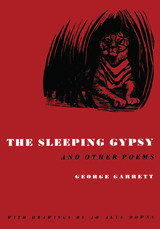
A shotgun marriage of fact and fiction by one of the most highly regarded writers and teachers of our time
A writer named George Garrett, suffering from double vision as a result of a neurological disorder, is asked to review a recent, first biography of the late Peter Taylor, a renowned writer who has been his long-time friend and neighbor in Charlottesville. Reflecting on their relationship, Garrett conceives of a character—not unlike himself—a writer in his early 70s, ill and suffering from double vision, named Frank Toomer. He gives Toomer a neighbor, a distinguished short story writer named Aubrey Carver.
As the real George Garrett and Peter Taylor are replaced by two very different and imaginary writers, the story becomes a wise and insightful exploration of American literary life, the art of biography, the comical rivalries among writers and academics, notions of success, and the knotty relationship of art to life, fact to fiction, and life to death. Double Vision is a witty tour de force and an elegy for a gifted generation of writers.

The fifteen stories of George Garrett’s Empty Bed Blues (his eighth book-length collection) are vintage Garrett—no two alike—with each moving, one way and another, in new and daring directions. His stories are deeply concerned with the old verities of love and death and filled with the joys and woes of characters who come to life and command our attention.
Diversity is the key word for Garrett’s short fiction. He works in every known form and invents a few himself. In “A Story Goes with It,” Garrett fondly remembers an old friend while retelling a story the man once told him. Most of it is probably not accurate, as Garrett is quick to admit, but the mixture of fact with fiction makes for an entertaining read. His stories turn like the sharp curves of a mountain road, abruptly changing from a fond trip down memory lane to a sleazy reporter’s quest along the backroads for the ultimate crime story in “Pornographers.”He tops off his collection with “A Short History of the Civil War,” a series of poems written by two participants: one a Confederate, the other a Yankee.
In the marriage of fact and fiction, of comedy and pathos, and the music of many voices, the stories of Empty Bed Blues reconfirm the judgment of novelist and story writer Richard Bausch, who said in 1998: “There is no writer on the American scene with a more versatile, more eclectic, or more restless talent than George Garrett.”

The Sleeping Gypsy is an important collection of poems by an American writer who was only twenty-nine when awarded the coveted Prix de Rome in 1958. When George Garrett’s first collected verse, The Reverend Ghost and Other Poems, appeared in Scribner’s Poets of Today: IV, critics hailed the emergence of an authentic new talent of great promise. Babette Deutsch, writing in the New York Herald Tribune, said, “His poems are short, highly charged, and also, as he intended, clear. They move rapidly, without waste, exhibiting a lively skill and vigor in action.… His sensitive perceptivity makes his thoughtful insights more memorable.” Louise Bogan, writing in the New Yorker, said, “It is good to come upon [in Garrett’s work] an ordered brilliance and effects, long neglected, that link us to the ancient tradition of English ‘song.’”
Readers will find in The Sleeping Gypsy all of the qualities that distinguished Garrett’s earlier collection of verse—the pointed, incisive writing, the abhorrence of “pretty” poetic words, the harsh impact of language that is, at the same time, strangely musical. Many will feel that, in this later work, these qualities have been enhanced and that Garrett’s advancing maturity indicates strongly that his early promise will be richly fulfilled.
READERS
Browse our collection.
PUBLISHERS
See BiblioVault's publisher services.
STUDENT SERVICES
Files for college accessibility offices.
UChicago Accessibility Resources
home | accessibility | search | about | contact us
BiblioVault ® 2001 - 2024
The University of Chicago Press









